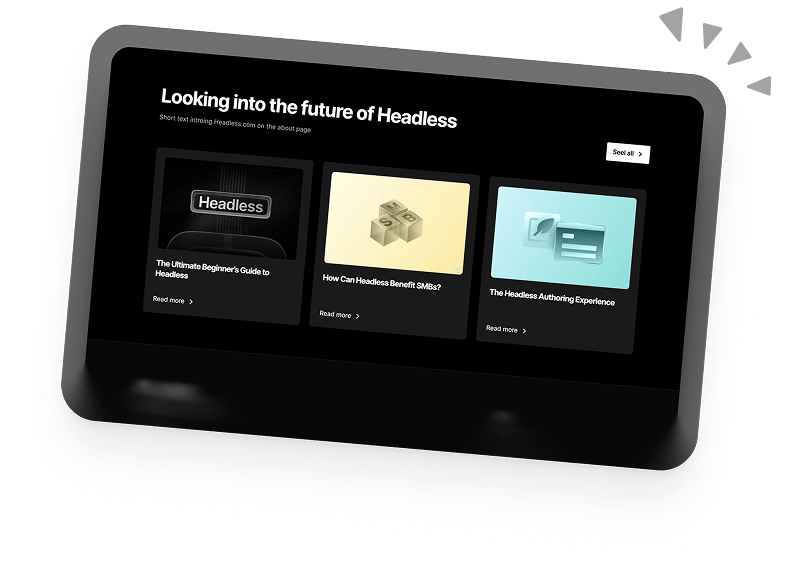WordPress as a Digital Experience Platform (DXP)
As an accessible and free CMS, WordPress has played a major role in making the internet a more accessible place. WordPress now acts as the basis for over 40% of all websites on the internet today. This number only continues to grow with an average usage increase of 12% per year. But, can WordPress work as more than just a CMS for websites?
With the functionality of WordPress continuing to expand, businesses began to experiment with using WordPress as a Digital Experience Platform. This new approach brings a dependable solution for creating a digital consumer experience typically locked behind cost-prohibitive platforms.
What is a DXP?
The requirement for individualization was the impetus for developing what became known as the Digital Experience Platform or DXP.
A DXP is a system that integrates various technologies geared towards creating and managing high-quality digital experiences. This includes tools for Customer Experience (CX) management, content creation, analytics, experience optimisation, e-commerce, and more.
What is the Difference Between a CMS and a DXP?
First, it is important to understand the distinction between a content management system (CMS) and a digital experience platform (DXP).
CMS
A Content Management System, often known as CMS, is the fundamental system that enables users to manage and classify the text, data, images, and other content on websites.
DXP
The Digital Experience Platform, abbreviated as DXP, goes beyond the simple act of transferring data between various digital media. It integrates advanced functionalities to control user experiences, e-commerce, customer relationship management, and omnichannel marketing for a higher level of customised experiences.
Traditional and Composable DXP
Traditional DXPs may be a specific entity, but most of them are suites of products created to function together seamlessly. These all-in-one DXPs can appear to be a simple solution. Nevertheless, their most significant drawback is that they tie brands into working with a single manufacturer. This makes it both challenging and costly to upgrade individual component quality.
Composable DXPs, in contrast, give companies the freedom to choose the individual solutions that will go into their digital experience architecture.
WordPress DXP
The all-in-one digital experience platforms do not have the versatility and the capability to customize what marketing professionals require. So, instead of using an all-in-one solution, marketing professionals are now looking to scalable digital experience platforms that use a variety of technologies. This allows a company to scale up the components of its DXP based on current needs.
Marketers can leverage WordPress as the basis for the components of a complete DXP. As a Headless CMS, WordPress can connect components to create a scalable, customisable, and complete digital experience solution.
Why use WordPress as a DXP?
Customers have come to anticipate that the companies they deal with will deliver a consistent experience on every digital platform. Large businesses are always looking for innovative ways to create comprehensive digital experiences for their existing consumers and potential new customers.
When it comes to developing a high-quality customer experience, content that connects with a business’ audience is necessary for driving business growth.
DXPs enable enterprise-level companies to improve the quality of the engagements they offer their consumers by enhancing how they communicate with those customers. These systems simplify the process of building, managing, and disseminating their materials across multiple channels. This allows companies to create personalized user experiences that satisfy consumer demands.
WordPress can effectively act as the “brain” of a DXP to provide consistent customer experiences and drive results. Here are three reasons why WordPress makes a great choice as a DXP:
1. Headless WordPress as the Core of a Composable DXP
It is no longer necessary for businesses to decide between a DXP and a Headless CMS. If you have a composable digital experience platform, you can position WordPress at the center of the DXP.
Headless WordPress enables various creative groups to:
- Create more material in less time and with less effort.
- Develop more specific content for a wider variety of audiences.
- Put the content into action across all channels.
- Monitor and analyse content impact.
- Maintain a high level of quality across that content.
2. Effortless Integration
WordPress as a DXP is here to remain with its growing connectivity between various applications and programs. Because it is open-source, it has a limitless number of possibilities to integrate with any medium through a plugin or easily-implemented custom code.
As a platform, it is continuously expanding its capabilities as both a Headless CMS and DXP. Companies continue to build off of WordPress resulting in a continuous expansion of its capabilities and an increase in potential integrations.
3. Protection for an Entire Business or Organization
Because of the exceptional level of security provided by the WordPress core, the most recent release of WordPress has not been subject to any significant security flaws. When it involves choosing the appropriate kind of DXP, company security is an aspect that deserves a lot of consideration.
WordPress DXP has successfully brought in enterprise-level security through the years and hardened the environment enough to withstand security issues and data theft-level attacks. They met this goal with the help of a constantly expanding community and professionals who have contributed to enterprise WordPress development.
Conclusion
Implementing WordPress as a DXP for businesses comes with many advantages. When building out a customer experience, WordPress offers the integrations you need to create a scalable DXP solution based on your needs.
Book a 30-min Introduction Call
Let's jump on a quick intro call We'll break down your project, and pinpoint exactly how we can help.



Our clients  Holaa! love working with us see their stories below!
Holaa! love working with us see their stories below!






